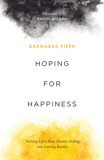
Growing up in conservative American Christianity I encountered a cultural phenomenon that never felt quite right to me. I call it “evangeliguilt”—a perpetual low-grade guilt about enjoying things.
It seems to have its roots in a perception of the puritans—our 17th century spiritual forebears—as dour, sour, no-fun, dry-bread gnawing, lukewarm-water-sipping killjoys. Since the puritans are so seminally important in our church history, this perception has flavored our ability to enjoy good things today.
Evangeliguilt is not outright skepticism about fun or happiness or pleasure. Rather, it exhibits itself much more in the tendency to make excuses for fun or to temper descriptions of enjoyable experiences so that they don’t sound too lavish or expensive.
It’s evangeliguilt that makes people say things like “I enjoy a glass of wine with dinner,” when what they really mean is that they have an impressive wine cellar and appreciate a good Malbec with steak or a Sauvignon Blanc with whitefish.
Other times it is revealed in response to a compliment. You might say “O, that is a nice jacket” and the response will be quick-draw fast: “Thanks, I found it on sale!” so as not to let you think they bought a name-brand item at full price.
By minimizing the impression of our indulgence in this way, we also avoid falling victim to other people’s evangeliguilt—that silent judgement on another’s “lack of stewardship” and the fact they really could have used that money to bless others.

A biblical framework for living a grounded, hopeful and genuinely happy life.
Evangeliguilt applies to work ethic too. We must earn leisure through hard work (what is often called a “puritan work ethic”) almost as if there is a ratio we must follow: eight hours of hard work earns one hour of relaxation, or something like that.
We also have to earn our caloric intake by being consistent in working out. Even on a day like Thanksgiving, we feel we have to go for a morning run to earn a right to feast. And vacations? In our guilt-ridden minds those are stressful interruptions in exhausting work schedules that just create more work when we get back. And we better not give the impression that we spent too much money on them either.
“Somehow our awareness of sin and fallenness has made us suspicious of over-enjoying anything.”
Almost none of this is expressed directly. It is much more of a gut feeling of guilt and a quiet sense of skepticism toward other, more ostentatious people (even as we feel jealous of their freedom to just enjoy).
In one sense, evangeliguilt is actually a twisted offshoot of good theology: belief in man’s sinfulness and our propensity to idolize things and expect too much of them. But somehow this proper theological emphasis has been misapplied so as to diminish our enjoyment of cheeseburgers and movies and dancing and laughter and myriad other delights of life.
Somehow our awareness of sin and fallenness has made us suspicious of over-enjoying anything. This is a problem, and not just because it’s a drag. It’s a problem because it’s not how the Bible depicts how life should be.
In contrast to our evangeliguilt, James 1:17 says: “Every good gift and every perfect gift is from above, coming down from the Father of lights, with whom there is no variation or shadow due to change.”
I love this verse because of the constancy and generosity it depicts in God. He is the giver of all good things and he will not change. He is not a capricious giver prone to whims or mood swings. He is a provider, rich with goodness for his followers.
At the same time, it’s easy to grab verses like this and slap them on anything we like to say “See? It’s from God!” as a sort of spiritual trump card to back up our preferences and desires.
But we don’t get to define what counts as a “good gift” or how we use them. Instead we need to look across the whole of scripture to get a picture of how God wants us to engage with and enjoy his good gifts.
As Julie Andrews once sang in The Sound of Music: “Let’s start at the very beginning, a very good place to start.” Genesis 1 lays the foundation for understanding what these “good and perfect gifts” are.
Time and again as God spoke creation into being he declared it “good.” This isn’t a term of comparison, as in “good-better-best.” This is “good” as in exactly what God intended, complete, perfect. The world God created was not ok or decent or fine; it was exactly right. It was good.
“Nothing is completely as it should be, but neither is the world utterly corrupt.”
We need to keep in mind what went wrong with the world (Genesis 3). But what we often forget is that sin and the curse did not evaporate the good and replace it. They did not recreate the world as a heinously evil hellscape. Sin corrupted the good, but the world still has God’s fingerprints all over it and tendrils of Eden woven through it.
Nothing is completely as it should be, but neither is the world utterly corrupt.
The good that once defined all of creation still shines throughout it.
In some situations it really does feel like we must search for the good and persuade ourselves it will be worth fighting for.
But there is more than just “some good” in this world; there is an abundance if we would open our eyes, discard our evangeliguilt, and recognize that this is still God’s creation. It is still the creation of the Father of lights from whom every good and perfect gift comes.
And Christians are invited to get in on the fun: “So, whether you eat or drink, or whatever you do, do all to the glory of God”(1 Corinthians 10:31).
This is an extract from Hoping for Happiness by Barnabas Piper. A biblical framework for living a grounded, hopeful, and genuinely happy life, this book gets far beyond the topic of work and helps us to throw off both the unrealistic expectations that end in disappointment and the guilty sense that Christians are not meant to have fun.